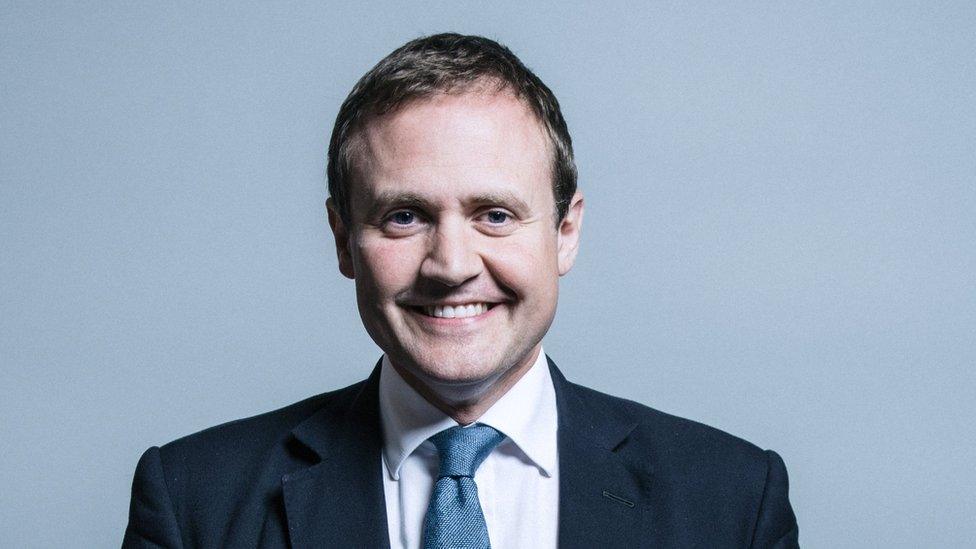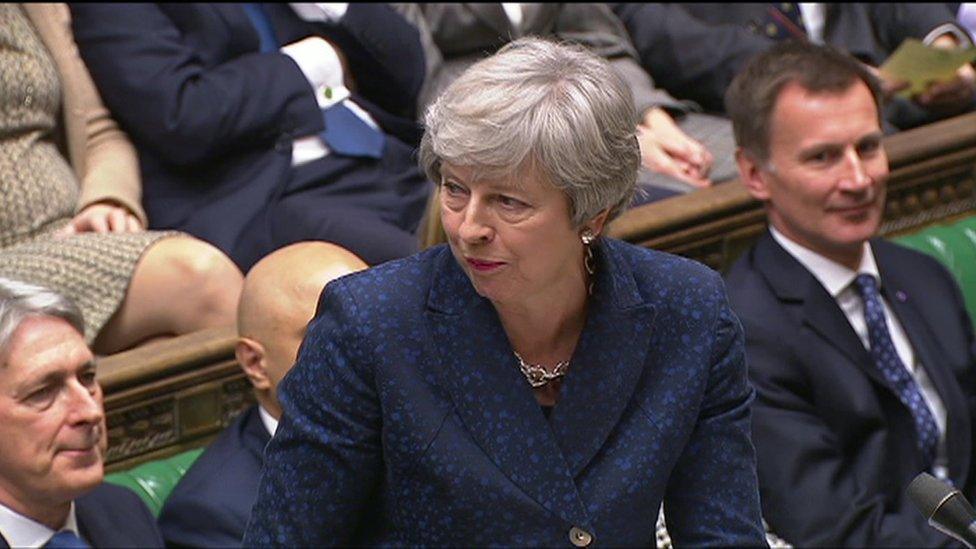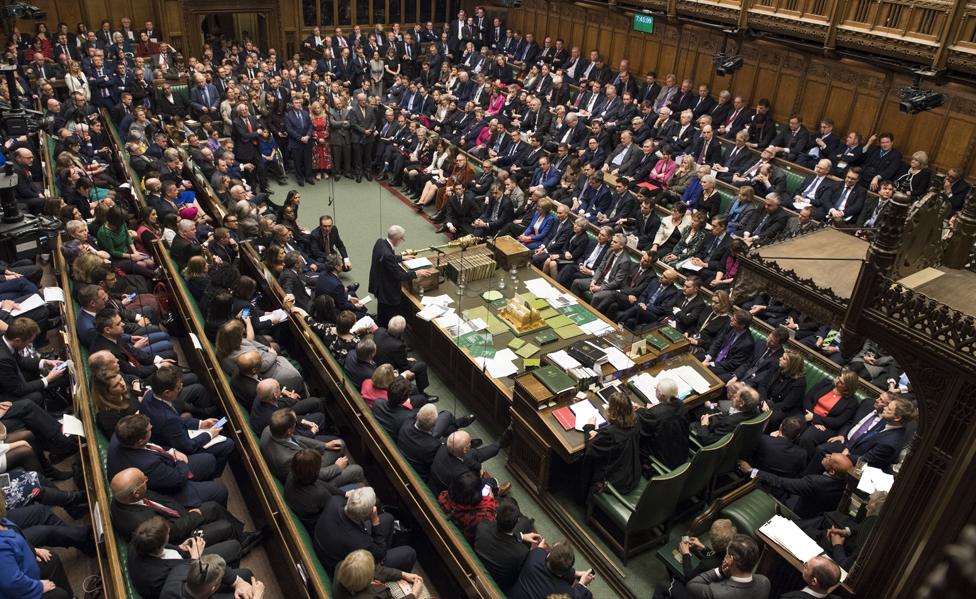Week ahead in Parliament
- Published
- comments

Parliament's brief respite from Brexit will end this week - and while a major debate is scheduled for Thursday, it is still far from clear how the week's events will unfold.
The thing to look out for is the sudden announcement of a new Business Statement from the Leader of the Commons, Andrea Leadsom, to rejig the parliamentary timetable, should circumstances change in some way.
MPs, and indeed Mr Speaker, would doubtless be very suspicious of any postponement, but it is far from impossible that the debate could be brought forward.
The first unknown is whether the prime minister will have a reversioned exit deal to lay before the House. Few expect she will, having emerged from her latest talks with a promise of more negotiations.
And in the absence of that, the promise is that MPs will have a debate on a neutral motion, to which they can attach amendments. In other words, something very similar in form to the series of votes held on 29 January, which yielded the "Brady Amendment" instructing the PM to seek to reshape the Northern Ireland backstop into a form Conservative backbenchers and the DUP could accept.
With uncertainty over the shape of any deal the prime minister may obtain, expect the next crop of amendments to be mostly about process - they may, for example, include a new incarnation of the proposal from Labour MP Yvette Cooper and Tory Nick Boles, to force the government to postpone Brexit Day, if they have no deal by the end of the month.
This was a potent legislative weapon, prioritising a bill which would then have been binding upon the government. It failed then, but, a fortnight closer to Brexit Day and to the prospect of a no-deal exit, a different version, perhaps featuring a shorter postponement, might be a runner.
The prime minister's Brexit deal is backed by 202 MPs but 432 vote against.
There may also be some attempt to muster support for a "soft Brexit" amendment to push the government towards a customs union-based Brexit - something which many Conservative Brexiteers would be deeply opposed to. At the moment this is all speculation - but watch out for supporters of assorted Brexit schemes breaking cover over the weekend, to announce their pet amendments.
Meanwhile there is a fair amount of Brexit business under way. The Lords will be spending much of the coming week hacking their way through dozens of Brexit-related orders and regulations, and there's what amounts to the first no-deal preparatory bill, in the shape of the Financial Services (Implementation of Legislation) Bill, external in the Commons.
Monday 11 February
The Commons opens (2.30 pm) with Work and Pensions questions, doubtless to be followed by the usual post-weekend crop of ministerial statements and urgent questions.
MPs then turn to the Financial Services (Implementation of Legislation) Bill, external - a major piece of legislation transposing a huge volume of EU regulations into UK law - it includes so-called "in-flight files" which are EU regulations that are not fully solidified into law, at the time of Brexit.
The day ends with a particularly interesting adjournment debate, led by the Conservative Craig Mackinlay, on reform of election law.
Last month, Mr Mackinlay was acquitted of charges of overspending in his election campaign in 2017 and says that he has "extreme concerns as to the clarity of election law, and the glaring grey area between national spending rules (under the Political Parties, Elections and Referendums Act 2000) and local spending rules (under the Representation of the People Act 1983)"; adding that "candidates and agents should never have to face the threat of criminal prosecution, with life-changing consequences, in the face of abstract law".
Intriguingly, he promises to offer "an elegant solution".
In Westminster Hall the Petitions Committee has scheduled a debate on e-petition 229178, external which states that: "School should start at 10am as teenagers are too tired".
The petition, which has more than 179,000 signatures, states: "Teenagers are so tired due to having to wake up very early to get to school. The government should require secondary schools to start later, which will lead to increased productivity at school."
This attracted 90,000 signatures in 19 hours last weekend, making it one of the fastest growing petitions since the e-petitions website opened in 2015. The government have not had time to issue a written response.
My committee pick is the Housing, Communities and Local Government session on local authorities' children's services (4pm).
This features academics and children's charities and will focus on the pressures faced by local authorities' children's services, including the increasing demand for child protection services.
In the Lords (2.30 pm) questions to ministers include the Labour peer and refugee campaigner Lord Dubs asking about the number of refugee children who have arrived in the UK from Jordan, Lebanon and Turkey under the Vulnerable Children's Resettlement Scheme which he was instrumental in creating.
Peers then look at Commons amendments to the Crime (Overseas Production Orders) Bill, where the key issue is on evidence in relation to the death penalty in third party countries. The rest of the day is devoted to (count them) nine Statutory Instrument approval motions: two on companies, limited liability partnerships, and on recognition of professional qualifications; and then two (to be taken together) on social security/ National Insurance payments, and on tax credits and Guardian's Allowance. These are followed by four Sis on insolvency and insurance; insurance distribution; financial conglomerates; and Financial Services Contracts.
Tuesday 12 February
MPs kick off (at 11.30am) with Business, Energy and Industrial Strategy questions.

The day's Ten Minute Rule Bill is the Child Cruelty (Sentences) Bill - the Conservative Tom Tugendhat will be calling an increase in the maximum sentence for child cruelty, prompted by the case of his constituent Tony Hudgell, now four years old. He was beaten so badly by his birth parents (Hudgell is the name of the parents who later adopted him) that he had to have both legs amputated. Mr Tugendhat wants judges to have the option of passing longer sentences than the current ten year maximum, in these very rare cases.
The main event is the detailed report stage consideration of the Mental Capacity (Amendment) Bill, external, which picks up recommendations from the Law Commission to review the Deprivation of Liberty Safeguards, external scheme, the procedures under which someone may be deprived of liberty because they lack mental capacity. There are a number of detailed amendments from the government and from Labour clarifying who is responsible for decisions in various circumstances, and an amendment from Labour MPs Chris Bryant and Debbie Abrahams dealing with the effects of the bill on people being treated for brain injuries.
The adjournment debate, led by the Labour MP Owen Smith, is on the licensing of medical devices - he aims to highlight what he warns is the weakness of the regulations of medical devices, as shown by successive scandals about surgical mesh, some hip replacements, pace-makers and breast implants.
He says more and more devices are being implanted in people, but with none of the scrutiny that medicines are subject to. He believes they should be tracked and evaluated once on the market - but the companies don't want to bear the cost of post-marketing surveillance.
In Westminster Hall (9.30am) the Labour MP Bambos Charalambous leads a debate on missing persons guardianship - he had a constituent whose brother went missing on the Galapagos Islands, whose body was never recovered. She tried to manage his affairs while not being able to produce a body. She found it virtually impossible to do so, because the mortgage lender would not discuss matters with her, and she was not able to cancel direct debits and manage her brother's affairs. Eventually, after a long passage of time, she managed to go down the presumption of death route.
This issue affects many people. A charity called Missing People, external estimates that more than 1,000 people go missing for over a year every year, where they do not know what has happened to them and have not found a body. These are not just runaways but people who are long-term missing. Their families, as well as having the grief, cannot manage their affairs.
The Guardianship (Missing Persons) Act was passed in April 2017 but has never been implemented, more than two and a half years later.
Other debates include the regulation of non-surgical cosmetic procedures, led by the Conservative Alberto Costa (11am); special educational needs and disabilities funding led by the Lib Dem Leader, Sir Vince Cable (2.30pm); then comes a Brexit-related debate on the seasonal agricultural workers scheme (4pm).
Labour MP Alex Norris wants to highlight the danger that post-Brexit schemes for farm workers might provide an opportunity for modern slavery, and practices like debt bondage and abuse by gangmasters. The Home Secretary Sajid Javid has signalled that he is aware of this issue, and Mr Norris is keen to quiz ministers about their plans.
The final debate (4.30pm) is on support for young carers. Labour MP Paul Blomfield has been pressing ministers to fund local authorities efforts to identify and support carers, particularly so-called 'invisible' carers who are not known to local councils or local groups.
My committee pick is the Welsh Affairs session on the future of the Wylfa Newydd nuclear reactor (2.45pm). Welsh Secretary Alun Cairns and Business Minister Richard Harrington will be quizzed on their next moves after the Japanese nuclear firm, Hitachi, pulled out of the £20bn project with the loss of thousands of jobs.
Meanwhile the Transport Committee has its final evidence session on the health of the bus market (9.45am) with the Buses Minister Nusrat Ghani, who will face questions on what the government is doing to support the industry and reverse the drop in passenger numbers on services outside London. The committee has been out and about investigating conditions in Leicester, Bristol and Liverpool and hearing from passengers, bus companies and local authorities about issues like funding, ticketing and regulation.
In the Lords (2.30pm) peers rattle through another job lot of Brexit-related statutory instruments: the Draft Aviation Safety (Amendment etc.) (EU Exit) Regulations 2019; the Draft Air Passenger Rights and Air Travel Organisers' Licensing (EU Exit) Regulations 2018; the Draft Air Services (Competition) (Amendment) (EU Exit) Regulations 2019 and the Draft Airports Slot Allocation (Amendment) (EU Exit) Regulations 2019 and the Draft Motor Vehicles (Wearing of Seatbelts) (Amendment) (EU Exit) Regulations 2018.
Wednesday 13 February
A busy Commons day opens (11.30am) with half an hour of International Development questions, followed at noon by Prime Minister's Questions.
The day's Ten Minute Rule Bill is proposed by Labour's Matt Western, who wants to limit bus drivers on local routes to driving for no more than 56 hours in any one week and 90 hours in any two consecutive weeks.
And then MPs will deliver their tributes to Sir David Natzler, the Clerk of the Commons, who is retiring after serving as the top advisor to the Speaker and MPs on constitutional and procedural issues.
Guide: The Brexit amendments and results
The PM will then update MPs on the progress of Brexit - with a statement which will feed into Thursday's debate on a neutral motion. MPs may also press for the Business of the House motion laying out the parameters for Thursday's debate to be discussed, and possibly amended on Wednesday, well in advance of the actual debate.

The main legislative action is a debate on the Securitisation Regulations 2018, external - this is about the new EU regulations on pooling different types of debt like residential or commercial mortgages, car loans or credit card debt obligations and selling the resulting cash flows as securities.
And after that there's a general debate on "connecting communities by supporting families and volunteers". The close of business would normally be the deadline for submitting amendments for discussion in Thursday's Brexit debate.
In Westminster Hall the opening debate (9.30am) is on the health implications of sunbed use - the Conservative Pauline Latham wants to discuss the dangers from the ultraviolet rays given out by sunbeds, which increase the risk of developing skin cancer, although it can then take up to 20 years to appear. She will quote World Health Organisation advice that sunbeds are as dangerous as smoking and argue for greater safeguards on their use. Other debates include the SNP's Tommy Sheppard on human rights in the UK (2.30pm) and the Conservative Ben Bradley on nurture and alternative provision in primary schools (4.30pm).
On the committee corridor, the Women and Equalities Committee have a promising-looking hearing (9.50am) on the use of non-disclosure agreements in discrimination cases, where the focus seems to be on their use by public bodies.
The witnesses are top officials from the House of Commons, including Saira Salimi, the Speaker's Counsel, as well as from the Cabinet Office, the BBC, and several local councils.
And the Brexit Committee (9.15am) has a star guest in the form of Bertie Ahern, the former Taioseach of the Republic of Ireland who oversaw the negotiation of the Belfast (Good Friday) Agreement. This is part of the committee's continuing inquiry monitoring the progress of the Brexit negotiations - and with the Northern Ireland backstop now such a critical issue, this will doubtless be a significant hearing.
In the Lords (3pm) questions to ministers include Lib Dem by-election guru Lord Rennard asking about providing greater clarity on constituency expenditure on behalf of a candidate and national expenditure on behalf of a party - he believes the current law allows almost unlimited 'national' party spending being targeted at individual constituencies. He will be asking ministers to bring forward secondary legislation which would avoid any confusion restore 'level playing field' principles.
Then it's back to Brexit, with a government "take note" motion on EU withdrawal together plus, on previous form, a Labour amendment which will then be pushed to a vote at the end - expect something which seeks to build on previous resolutions of the Lords by urging the government to avoid a no-deal Brexit.
Meanwhile, the week's third batch of orders and regulations will be discussed in the Moses Room (the Lords equivalent of Westminster Hall): the Construction Products (Amendment etc.) (EU Exit) Regulations; the Storage of Carbon Dioxide (Amendment and Power to Modify) (EU Exit) Regulations; the Ecodesign for Energy-Related Products and Energy Information (Amendment) (EU Exit) Regulations and the Kimberley Process Certification Scheme (Amendment) (EU Exit) Regulations.
Thursday 14 February
The Commons opens (9.30am) with Transport questions, followed by questions to the Leader of the House, Andrea Leadsom.
The main debate is on the UK's withdrawal from the EU (see above) and it will probably culminate in a couple of hours of voting on alternative ideas about Brexit.
The timing of these will depend on the Business of the House motion, but expect them in the early evening. A key moment will be the Speaker's selection of the amendments to be discussed.
In Westminster Hall, there's a debate on the effect of Santander branch closures on local communities.

In the Lords (11am) the usual half hour of questions to ministers is followed by a another helping of statutory instruments including the Guaranteed Minimum Pensions Increase and compensation payments for Mesothelioma and Pneumoconiosis.
All three of these have already been through the Commons. Then comes the week's fourth batch of Brexit orders and regulations, including the Immigration (Leave to Enter and Remain) (Amendment) Order 2018.
There's also a short debate on improving immigration procedures in the UK, led by the Lib Dem, Lord Roberts of Llandudno.
Neither House sits on Friday.
- Published30 July 2019

